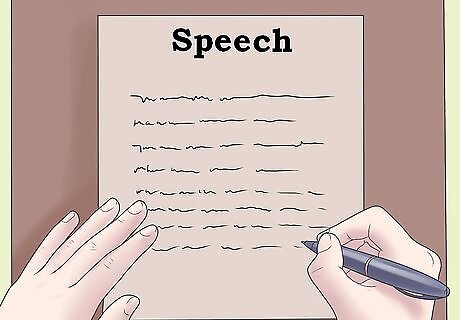
views

Choose your sources carefully. There should always be enough of the right kind of evidence to support your thesis statement. Do plenty of research before you begin writing, and choose only those sources that provide new, interesting, relevant material to use in your work. Above all, when choosing sources, consider the relevance to your own writing. Your sources should support your claims, not lead the reader off on tangents. At the same time, your writing should not simply paraphrase various sources; you should offer a unique perspective or new information, adding something important to the wealth of existing knowledge.

Use citations strategically. Citations are absolutely necessary in order to avoid plagiarism, so must always credit your sources. Additionally, citations indicate how grounded and in-depth your knowledge is, and contribute to making you more trustworthy as an author. Use specific, targeted citations to support your claims, particularly the more controversial ones.

Organize a logical progression of ideas. Order your paragraphs and supporting evidence in a linear progression through use of verbs, transitions, and signal phrases. For instance, begin with a summary of the background research, then turn to your own work. Introduce your project or experiment, describe your methods, report your findings, and then discuss their significance. Always make it clear exactly what you hope to accomplish with each part of your paper and with the paper as a whole, and organize your paper in a way such that this logical progression is perfectly clear.

Pay attention to tone and style. When writing an academic paper, it can be tempting to use big words and complex sentence structures to try to sound smart. In fact, however, these structures only succeed in complicating your writing and obfuscating your ideas. They can make you seem pretentious and make it much more difficult for your readers to understand your ideas. Keep your tone casual and informative, and make sure the whole paper reads as simply and clearly as possible.

Keep in mind a clear sense of your purpose, audience, and genre. This will help you develop a more effective writing style.

Do plenty of reading. Whether it be your favorite fashion magazine, a news article, or a novel, reading introduces you to different writing styles and techniques and gives you an idea of what does and doesn't work. Reading academic writing in your field will familiarize you with the standards and habits of fellow writers, and as you read more, you will start to get a feel for how you should be writing. Pay attention to writing tricks and techniques as you read, and take note of any you might use in your own writing.

Practice writing. The more you practice your writing, the better you will become. Try writing academic papers on any topics that come to mind, whether or not you have to turn them in for an assignment. Work on developing your writing style and try out different tricks in each piece you write. Try not to get stuck on the mechanics of grammar, spelling, and formatting - think instead about the overall tone, how you organize and present your ideas, and the goal of your writing.

Enter into a conversation with others through your writing. As a writer, you need to do more than make well-supported, and consistent arguments. Remember that you are not writing in a void. It is important to engage the audience and realize that yours is not the only one out there. Be well aware of the body of current and emerging work. Read other works that are related to your own, and respond to them in your own writing. When doing so, make sure to explicitly identify other viewpoints and respond to them appropriately, otherwise, your writing probably will not make any sense. In other words, what you are trying to say may be clear to your readers, but not the reasons for saying it nor how it fits into the milieu.

Discuss the significance of your work. When writing, keep your readers interested by showing them why your thoughts are important. It's not enough to discuss your ideas and present your findings.—You also have to address the broader significance of your work. #Place your work in context of the academic field at large. Talk about what it does different from or more than every other paper; discuss the implications of your work for the field and open up suggestions for the future, where to go next.

Solicit and respond to feedback. Ask contemporaries and experts in the field for their impression of your ideas and their formulation. Plan to iteratively respond to the issues raised by each piece of feedback. Here, it is important to remain flexible and responsive, both in your viewpoint and your writing style. By stretching into new ways of thinking and writing, you will increase your ability to write clearly and in an understandable way so that your ideas will have maximal impact.



















Comments
0 comment